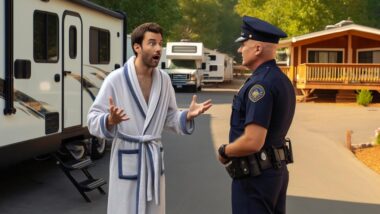Table of Contents Show
Whether you’re a newbie or a veteran, buying an RV can be an emotional roller coaster.
The various stages of the process can be full of loops, turns, and corkscrews. Luckily, you can minimize the chaos if you avoid doing several things.
Today, we’re sharing those things you shouldn’t do when buying an RV. Are you ready?
Let’s get to it!
Is Buying an RV Challenging?
Yes, buying an RV can be challenging. It’s easy to feel overwhelmed due to the many available options. Many people throw in the towel on their adventure dreams because they experience decision fatigue.
First, you’ll need to narrow your options to the type of RV you want. Driveable or towable? Fifth wheel or travel trailer? Determining your RV type can significantly depend on how and where you plan to use your recreational vehicle.
Next, it’s time to start considering brands and floorplans. Industry experts estimate that over 800 different RV brands exist across 280 RV manufacturers in the United States.
Unfortunately, some are better at making recreational vehicles and providing customer service. If you choose a crummy brand, your dreams may quickly become a nightmare.
Because manufacturers recognize the need to appeal to various types of people, they offer many different floorplans. What works best for an adventurous couple differs significantly from what works for a large family. You’ll find models with bunkhouses, multiple bathrooms, massive living spaces, and more.
Once you’ve selected the perfect RV, it’s time to find a dealership and buy it. Avoid only considering local dealers. Sure, they may be the most convenient option. However, expanding your search radius can save you hundreds or even thousands of dollars on your purchase.
Sadly, your mission isn’t complete once you locate that dream rig. You’ll need to go through the purchase process at the dealership.
This is typically a much simpler process if you’re paying in cash. On the other hand, financing an RV can be challenging. There’s a good chance you’ll need a high credit score and spotless credit history.
While it may be challenging, it’s worth it. You can make priceless and unforgettable memories in your camper.
What Not To Do When Buying an RV
Unfortunately, some behaviors and decisions can complicate your mission. If you want the process to be as smooth and painless as possible, there are several things you need to avoid doing.
Don’t Rush the Process
Once the train has left the station for your RV-buying experience, it’s easy to get in a hurry. You start imagining you and your family heading out on epic trips and adventures. While there’s nothing wrong with getting excited, your emotions can cause you to make quick and often bad decisions.
Give yourself plenty of time to go through the entire process. Many buyers spend several months researching and considering all of their options. Visit multiple dealerships so you can touch and see the rigs in person.
Taking time can help you select the right camper and get the most bang for your buck. We’ve heard of far too many owners rushing the process and buying the wrong rig. This can be a significant financial mistake as RVs depreciate very quickly. In the end, it could cost you several thousand dollars.
Don’t Ignore Your Tow Vehicle Capabilities
Another mistake many people make when buying an RV is ignoring the capabilities of their tow vehicle. Two of the most important ratings you must consider are the payload and towing capacities. Staying within these ratings keeps you, your passengers, and others on the road safe.
Payload capacity refers to the weight you can place on a vehicle. This includes passengers, cargo, and the pounds from the trailer on the hitch. Exceeding your payload capacity can lead to increased wear and tear on your vehicle.
Additionally, the towing capacity is another critical rating that you must consider. It refers to the amount of weight your vehicle can pull. However, this rating also considers the vehicle’s brake system and ability to stop.
Towing capabilities vary widely from one vehicle to the next. As a result, you’ll need to check the ratings specific to your vehicle. A sticker inside the driver’s side door typically provides the payload capacity. However, you may need to check with the manufacturer or your owner’s manual for other ratings.
Avoid Ignoring Additional Costs
Anyone telling you that owning an RV is cheap is lying to you. Many buyers forget to consider the additional costs associated with being an owner. Trust us, they can add up quickly and catch you by surprise.
Items like wheel chocks, leveling blocks, and potable water hoses are all things you’ll need. You can use some of your old equipment if you own an RV. However, your bank account can take a brutal hit if you’re a newbie.
Another hidden expense that comes with owning an RV is insurance. RV insurance can get pricey depending on your rig, how you’ll use it, and where you live. If you plan to travel full-time in your camper, you’ll want to ensure your policy covers the contents, not just the RV.
Unless you’re full-timing in it, you’ll need a place to park your rig when you’re not using it. If you’re lucky and have a place at home to park it, you don’t have to worry about this. However, many owners pay a pretty penny at storage facilities to keep their RV safe and secure.
Finally, whether you choose a driveable or towable RV, most are incredibly inefficient regarding fuel. This may be fine if you only take short weekend trips. However, fuel stops can add up considerably on a cross-country road trip.
Don’t Skip the Inspection
Many buyers think they don’t need to hire a third-party inspector just because they’re buying a brand-new rig. Dealerships will brag about how thorough their pre-delivery inspections (PDIs) are and how they may have fixed issues upon delivery. However, it might surprise you how much they miss during PDIs.
Hiring a third party that’s a certified RV inspector is something we always encourage. While it may cost you a few hundred dollars, it can save you thousands. They’ll test the systems and ensure everything is in good working order. You’ll typically receive a very detailed report when they finish the job. You can then use this to make an informed decision regarding the purchase.
Unfortunately, some dealerships do not allow third-party inspectors. We suggest you walk away from the transaction if you’re dealing with one of these establishments. We don’t know about you, but it makes us wonder what the dealership is trying to hide.
Don’t Forget About Storage
When buying an RV, it’s a good idea to consider storage. You’re likely going to have equipment and toys that you want to bring along with you. Generally, the more storage space you have, the more things you can bring. However, driving across a CAT Scale is an excellent way to ensure you stay within the ratings for your axles.
Typically, fifth wheels and Class A motorhomes will offer the most storage. You’ll likely need to get creative if you’re considering travel trailers or Class B or C motorhomes. These rigs generally provide the least storage space and can make it challenging to bring your stuff.
Don’t Overlook Your Budget
One mistake you cannot afford to make when buying an RV is overlooking your budget. A big and beautiful fifth wheel may have everything you could ever want in a camper. However, the steep price tag can snap you back into reality.
Not only do you need to consider the cost of your RV, but also the additional costs we discussed earlier. Unless you camp on public land, you’ll likely need to make reservations at campgrounds and other facilities. Depending on the facility, these can range from $15 to $100+ per night.
Before signing on the dotted line, you must confirm your camper fits within your budget. If you need to upgrade your truck to haul it, factor those costs into your budget. We’ve seen far too many RVers make major financial mistakes because they didn’t take the time to consider their budget.
Don’t Fall for High-Pressure Sales Tactics
While car dealers often get a bad rap, RV dealers aren’t much different. They’ll say and do almost anything to get you to sign on the dotted line. However, don’t fall for their high-pressure sales tactics. Whatever “special deal” they’re offering you today will likely still be available tomorrow, especially if they want to make the sale.
Yes, someone could swoop in and buy the rig before you. However, don’t let this fear get in the way of taking your time to make a solid financial decision.
Avoid Impulsive Purchases
Again, take your time when buying an RV. The high-pressure sales tactics that dealerships use can lead to you making an impulse decision. That’s what dealers hope will happen because they know many people make bad decisions in these situations.
You’re typically under no obligation to purchase from them until you sign on the dotted line. Just because the employee walked you around their lot and shared information doesn’t mean you owe them anything. Run away from any dealer that makes you feel any different.
Don’t Forget to Negotiate
Finally, the last thing you want to avoid when buying an RV is to forget to negotiate. Typically, you can negotiate 10 to 30% below the manufacturer’s recommended sales price (MSRP). However, there were a few years when buyers were paying this or slightly more for RVs.
If the dealership isn’t willing to budge on the price, try to get them to sweeten the deal. Be bold and ask about camping memberships, gift cards for accessories, and anything else you can think of. Remember, the worst that can happen is that they say no. They want to do all they can to close the deal and get paid. So, don’t be afraid to ask.
Be Smart When Buying an RV
While buying an RV can be stressful and exhausting, it doesn’t have to be. You can purchase smart and confidently when you avoid doing what we’ve shared above. You’ll feel good about your purchase and be able to enjoy using it with your friends and family. So, whether you’re buying your first or 50th RV, be an intelligent consumer when purchasing your next rig.






